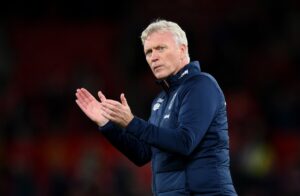
NBA Trade Rumors: After all said and done! “The Golden State Warriors Must Trade Stephen Curry to Secure Long-Term Success and Avoid Mortgaging the Future if They Are Not Willing to Sacrifice Their Assets for Immediate Contention”…
The idea of the Golden State Warriors trading Stephen Curry is a subject of considerable debate, often fueled by concerns about balancing their current championship aspirations with long-term sustainability.
As the face of the franchise and one of the most accomplished players in NBA history, Curry represents more than just on-court excellence—he’s the cornerstone of the Warriors’ identity.
However, if the team remains unwilling to “mortgage the future” by leveraging young talent and draft assets for immediate success, some argue that moving Curry might become a necessary option to transition to a new era.
The Case for Keeping Stephen Curry
Stephen Curry’s value to the Warriors is immeasurable. Beyond his on-court contributions—he’s still performing at an elite level, averaging over 25 points per game—the cultural and financial impact of his presence is unparalleled.
Curry has redefined the Warriors’ brand, making them one of the most popular teams globally.
Moreover, Curry’s leadership extends beyond his scoring. His influence on younger players, his ability to attract top-tier talent, and his unwavering commitment to the organization create a foundation for success.
Trading him would not only dismantle this legacy but could alienate a fanbase that views him as synonymous with the Warriors’ golden era.
The Warriors’ Reluctance to Mortgage the Future
The Warriors’ leadership, including Curry, Draymond Green, and Steve Kerr, have publicly emphasized their resistance to making desperate moves that compromise the team’s future.
Draymond Green has stated, “Bad teams mortgage the future for short-term gains. That’s not who we are.” Steve Kerr echoed these sentiments, highlighting the importance of maintaining organizational stability and avoiding impulsive decisions.
This approach has led to a careful balancing act. The Warriors have sought to develop young players like Jonathan Kuminga and Moses Moody while remaining competitive.
However, their reliance on unproven talent has occasionally hindered their ability to contend against teams with more experienced rosters.
The Argument for Trading Curry
For those advocating a Curry trade, the rationale often stems from the belief that the Warriors are stuck in a transitional phase, unable to fully commit to either rebuilding or contending.
Curry’s value on the trade market would be astronomical, potentially yielding a treasure trove of young talent and draft picks.
By trading Curry, the Warriors could accelerate a rebuild, positioning themselves for future success while avoiding the pitfalls of mediocrity.
The assets acquired could be used to construct a new core capable of competing for championships in the next decade.
Risks of Trading Curry
Despite the potential benefits, trading Curry would be a monumental risk. There’s no guarantee that young players or draft picks will develop into stars.
Additionally, the loss of Curry’s leadership and the emotional impact on the team and fanbase could have long-lasting repercussions.
Moreover, trading a player of Curry’s stature sends a message to the rest of the league and prospective free agents. If the Warriors are willing to part ways with their most iconic player, it could deter others from committing to the franchise in the future.
A Middle Ground?
Instead of trading Curry or mortgaging the future, the Warriors could explore other avenues to improve their roster. Packaging mid-level assets or role players for a high-impact player might strike the right balance between short-term competitiveness and long-term planning.
The team might also focus on optimizing their current roster by better integrating younger players with veterans. For instance, giving Kuminga and Moody more significant roles could bridge the gap between the team’s present and future.
The idea of trading Stephen Curry highlights the broader challenge facing the Warriors: how to navigate the inevitable transition from their current era of dominance to the next phase of the franchise.
While some may argue that trading Curry is a logical step if the team refuses to sacrifice its future, the emotional, cultural, and strategic costs of such a move are immense.
For now, the Warriors appear committed to walking the tightrope between contention and sustainability. Whether this strategy will yield another championship or necessitate more drastic measures remains to be seen.
One thing is clear: as long as Curry remains in Golden State, the Warriors will continue to be a force to reckon with, both on and off the court.






